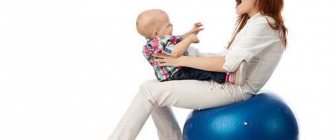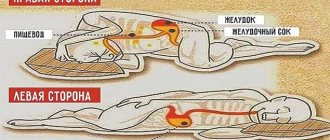Life of a young mother
The life of a young mother (harsh reality) About the image The slender beauties depicted in magazines with impeccable makeup, beaming with maternal love and carelessly, as if without any effort, holding cheerfully grinning models of babies (or maybe stuffed animals) in their hands, can in no way serve as an example for you ! A real mother is a zombie with crazy eyes and tangled legs, who doomedly drags a wobbling stroller through the park, in which her beauty screams in a bad voice. At home she walks around in a tattered robe and with unkempt hair, eats scraps of porridge, sausages and dumplings, and is ready to kill her own husband if he is late from work for even 2 minutes, for which she quietly hates herself. And sometimes loud. Deal with it. Everyone goes through this, but for some reason almost no one admits it. Buy yourself more fashionable robes in advance and change them often. At least some variety. About sex NO sex after childbirth!!! That is, only maniacs want it, for whom even a baby bottle with a nipple evokes indecent associations. Normal mothers fall into bed in the evening, exhausted to such an extent that the thought of harassment from their husband also causes nervous spasms. Therefore, it is better to prepare your spouse for this sad discovery in advance, and even better - to shift some of the troubles about the child onto him, after which he will also become tired. About mutual understanding If your child is crying, and you can’t calm him down and you’ve already given up, don’t be shy - cry with him. I guarantee that after just two minutes of your genuine lamentation over your ruined life, your child will begin to smile, or even laugh boisterously. Babies love to watch adults cry. They are ready to revel in this spectacle for hours. About complementary foods The best way to introduce a new food to your child is not to give it. It is best to turn your back to him and pretend to be greedily devouring the suspicious contents of the jar. Not a single normal child can resist such a provocation, and if you are not quick enough, he will even swallow the lid. The main thing is not to actually try this crap. About complexes: Don’t let the mothers you know in the park trample you into the dirt with stories about the successes of their young geniuses. Every mother wants to brag about her child, so tell us too! Key table: “And my child eats homemade cottage cheese with such pleasure!” (yes, that dry, sour and disgusting-tasting substance that comes out when you melt baby kefir with calcium gluconate) - “Once I managed to stuff three whole spoons into it.” “And ours teeth erupted without any problems!” “To be honest, I don’t remember a damn thing - the first year was a complete nightmare, and my memory hastened to get rid of it.” “My child has been sleeping in his crib since birth!” - “Yes, and I get up to rock him five times a night, and at four in the morning I give up and take him to bed.” “Breastfeeding is so easy and pleasant!” “Except for three mastitis, wet T-shirts, a strict diet, teeth being sharpened on your chest and the inability to go anywhere for more than two hours.” “I carry it in my arms only when absolutely necessary!” - “that is, only five to six hours a day.” “- artificial feeding is so easy and pleasant!” - “especially when you have to crawl out of a warm bed on an unheated autumn night and trudge to prepare a mixture, after which you cannot sleep for an hour, and the child is covered in a rash like a leopard and itches like a cat with lichen.” “I sometimes walk with him up to 8 hours a day!” - “one day I lost my keys and had to wait for my husband to get home from work” “he already speaks so well!” - “I can isolate from the indistinct stream of sounds “gee!”, “la?” and “vyga”, I wish I knew what it means” “- he’s so smart and doesn’t interfere where he shouldn’t” - “after I gave him a good slap in the butt a couple of times” “- my husband takes care of the child for a long time and with pleasure ! - “Yesterday he held it under his arm for an hour and a half, sitting in front of the TV with hockey.” “I can do everything!” - “a housekeeper comes to see me five times a week” “-I manage to do everything and it doesn’t bother me at all!” - “a housekeeper and a nanny come to see me five times a week” About the development of fine motor skills Buy a bag of beans, a bag of lentils and a bag of millet and hide it away. The only thing a child under one year old will do with them is grab them by the handful and scatter them around the kitchen, thoughtfully admiring the result. To develop fine motor skills, it will be much more productive to scatter a handful of stale bread crumbs in front of the child. Know-how! It should be patented)) About self-control Learn and if something happens, repeat two mantras: “This will all pass” and “He will definitely grow up.” No, they don't help at all. But at least six words will be added to the child’s vocabulary besides “stop, give up, shut up.” About proper nutrition The 5 most popular dishes among young mothers are unhealthy and tasteless, but quick to prepare. 1. dumplings 2. sausages 3. crab sticks 4. bread 5. salad of dumplings, sausages and crab sticks with bread. About guests Do not take your child to visit childless people. Not in the sense that it looks like boasting, but because of the difference in your psychologies. No matter how much excitement the owners feign, they are not at all moved by the sound of a child’s cry and the spirit of a pooped diaper is not sweet, especially if you change it with a sweet smile right on their sofa near the festive table. About constant supervision Children can crawl. Moreover, they know how to climb, and mostly where they don’t need to. Therefore, where it is not necessary should be barricaded so that even the special forces cannot pick the door, and where it should be divided into two halves - where it is necessary and where it is supposedly not necessary, so that the child retains the illusion of freedom. For example, tie the handles of cabinets with glassware, leaving them open with plastic ones and closed, but not tied, with pots. Rest assured, the child will go straight to the closed one and will enthusiastically poke around in it for half an hour. The next day you can open it and close it the next... By the way, keep in mind that soon children will pick out even something that is tightly stuck. About domestic injuries By the year, the expression “were you dropped head down from the stove as a child?” will take on a completely different meaning for you, because by this age there will simply be no furniture left in your apartment that your child would not fall head over heels with for educational purposes. You will also become familiar with the sayings in all their glory: “no matter what a child amuses himself, only would not cry” (which, translated into modern language, sounds like this: “If you choked on my cell phone for two hundred bucks, just shut up” and “not diarrhea, then scrofula” (this is for the section on complementary foods) About maternal love. Attacks of maternal love overtake you mainly in two situations: when the child is sleeping and when you are bragging about him. Control yourself: children really don’t like being woken up - even by passionate kisses, and from the outside it looks like an exacerbation of schizophrenia - when you talk about yourself in the plural, you roll your eyes and splash your interlocutor with saliva of admiration. Childless people, out of habit, are very frightened. About fanatics In any butuzo-walking park there will certainly be a group of mothers who, foaming at the mouth, will preach to you that a child cannot get bored, spanking him on the bottom is sacrilege , and calling him an asshole is blasphemy. Politely agree and quietly get lost among the trees. There are also many religions, and this does not mean at all that you should stupidly join the first sect you come across. It’s best to organize your own and walk around with a poster “I hate children who cry and dogs that bark” hanging on the stroller and a badge with the image of the ideological leader Freken Bock on the chest. I assure you, you will have no less adherents, half of them will also run away from the above-mentioned luminaries of matrimonial love. Despite all of the above and much, much more, your life will seem irrevocably ruined to you, and this is NORMAL!! AND THE WORST thing is that by ten months you won’t give a damn about it! After all, now you have a small bummer who has your sly smile and nasty character. Be strong, young mothers!!!
Preface
During pregnancy, a woman basks in the increased attention that others pay to her physical and emotional needs.
But all this attention and all the thoughts of the woman herself are aimed exclusively at the upcoming birth and the well-being of the child. After childbirth, when the euphoria of the first days and the relief that everything went well is over, a feeling of exhaustion appears. All attention is now turned to the child: medical staff, caring relatives and friends all give advice on what the child should eat, what to wear, where he should sleep and what to play with. There are many books available in stores about pregnancy, childbirth, breastfeeding and parenting, and most parents acquire a substantial library on these topics even before the birth of their first child.
Meanwhile, mom is exhausted and may be suffering from pain from an episiotomy or from congested breasts. The euphoria of the first hours after childbirth is replaced by a desperate need to sleep and recover.
This book is addressed to those who are concerned about the physical and emotional health of a woman after childbirth. This is not a guide to breastfeeding or baby development, although any book about the postpartum period would be incomplete without information on these topics.
I just want to talk to you - to the young mother and father, to your parents, relatives, and health workers.
I hope that by reading about other parents' experiences you will realize that you are not alone.
Analyzing information from books and newspapers will help you rethink and logically explain the changes and emotional outbursts that you are experiencing now. You will also learn to distinguish the normal process of adaptation to difficulties from manifestations of postpartum depression.
I hope that my personal experience and the review of research presented here will be useful to professionals whose work is related to maternal health. It can be so difficult to watch how an absolutely healthy young mother finds herself at a dead end, alone, face to face with difficulties that she is not able to cope with on her own, and to understand the negative impact this can have on relationships in her family.
This book examines the main risk factors for postpartum abnormalities. Without a doubt, a woman whose family life is marred by the loss of a loved one, divorce, loss of a job, or complicated by constant travel, finds it much more difficult to take root and form her own protective system. Single mothers and abandoned wives, immigrants torn from the environment of a large family - all these women have an order of magnitude heavier burden, and the more society is aware of this, the more effective the help and psychological support provided to such women.
Perhaps the most terrible test that can befall a woman is life after childbirth, when the child who gives it all meaning is no longer there. I hope that the chapter on how to cope with grief after the death of a child in the womb or in infancy, and how to cope with the situation when the child ended up in the intensive care unit immediately after birth, will help make the situation of parents a little easier and will be useful both for themselves and for themselves. and their loved ones.
But no matter how successful the pregnancy and childbirth were, no matter how stable and constant the family relationships were, this time period does not stand alone in a woman’s personal history. Each woman comes to her birth with a wealth of experience and a formed attitude towards parenthood, bringing with her a whole layer of beliefs and impressions from her own childhood, skills and talents accumulated during study and work. All these values also influence her decisions after the birth of the child: to breastfeed or not to breastfeed, when to return to work, when to plan the next pregnancy.
If mothers sometimes feel that after giving birth everything is focused on the child, then fathers may feel completely excluded from life. The section of this book addressed to young dads was originally intended to be one chapter. I thank Martin Richards of the Early Childhood Education Group, Department of Sociology and Political Science, University of Cambridge, who sent me his comments and suggestions on this topic. There was a lot more material, and I decided to separate psychological recommendations for new fathers and practical parenting tips that I shared with mothers.
Since a new mother is also a daughter, and possibly a granddaughter, sister and niece, it is important to pay attention to the dynamics of the entire family as a whole. For example, grandparents' ability to adapt and their emotional well-being will inevitably affect how much support and help they can provide to the younger generation.
Many adaptation difficulties of life after childbirth take young mothers by surprise. And if a woman already has children, with the advent of a new child new problems arise: she has to constantly regulate the relationship between children as they grow up.
So, together we will look at the different aspects of what is sometimes called the “fourth trimester” or the fourth phase of the pregnancy year.
Books, like children, are not born overnight, and the gestational period of this book lasted much longer than a normal pregnancy. Having worked with couples for many years throughout pregnancy, I realized how little prepared they are for what happens after childbirth, and how useful a book on this topic would be.
Therefore, I am grateful to everyone who helped me and inspired me to do this work. From the moment I submitted the book to Element Books
, I have been in constant contact by email and phone with Senior Editor Julia McCutcheon, and I am very grateful for the professionalism and efficiency with which she and the rest of the
Element
worked on this book.
I also thank the National Childbirth Trust, where I began my career as a childbirth educator, and all my clients and colleagues who shared their joys and challenges with me.
It's not always easy to meet deadlines with a family and a job, but each of my family members made their own special efforts to help me move forward.
Given the theme of the book, it is obvious that I could not have written it without being the mother of four very energetic and inspiring children.
And indeed, now that they are grown up, it touches me to think how much of an influence they had on this book.
I'd like to give special thanks to my two "IT managers" - husband David and son Anthony - who introduced me to the mysterious world of word processors and gave me advice over the phone when I had problems using them. And to my daughter Sarah, who helped me get books from libraries all over the country. And Jonathan and Daniel, who gave me many great ideas for restoring balance.
With the arrival of my daughters-in-law Einat, Lilah and Galit, and son-in-law Eran, our family has expanded, and being part of their journey has strengthened my belief that motherhood is a lifelong, active job that never retires.
I received my copy of the first English-language edition of this book on the very day our first grandson, Amit, was born. There are eleven of us! And this event opened a new chapter in my life.
David is of course not only my IT manager, his support and enthusiasm for my work over the years has helped me develop and continue to learn. I never heard a single complaint from him, despite the fact that our house was constantly hosting classes and meetings, and the dining table had to be cleared of piles of books and papers before every meal.
If I had not been distracted by family and work, this book would most likely have been written many years ago, but I hope readers will agree that the practical experience contained in these pages greatly enriches it.
Therefore, I am grateful to everyone who helped me and inspired me to do this work. From the moment I submitted the book to Element Books
, I have been in constant contact by email and phone with senior editor Julia McCutchen, and I am very grateful for the professionalism and efficiency with which she and the rest of the
Element
worked on this book.
I also thank the National Childbirth Trust, where I began my career as a childbirth educator, and all my clients and colleagues who shared their joys and challenges with me.
And finally, I would like to thank the Resurs publishing house for publishing this book in Russian.
It's not always easy to meet deadlines with a family and work schedule, but each of my family members contributed their efforts to help me move forward.










